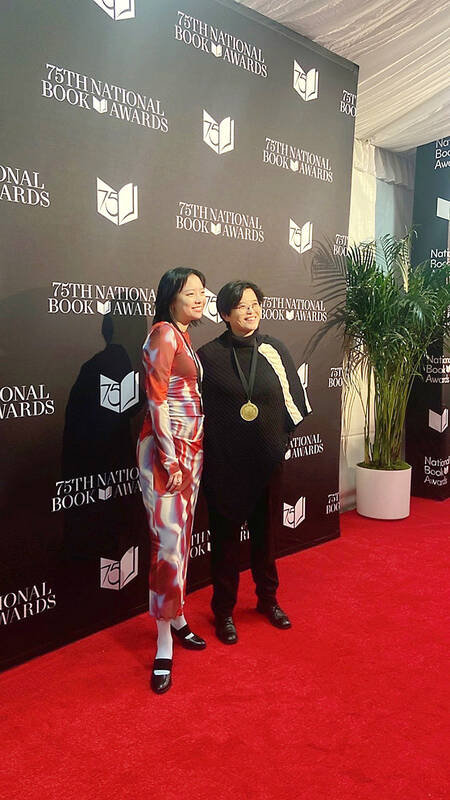The English translation of Yang Shuang-zi’s (楊?子) Taiwan Travelogue (臺灣漫遊錄) made history after it became the latest winner of the US National Book Award for Translated Literature.
The novel, translated from Chinese by Lin King (金翎), was recognized at an award ceremony on Wednesday in New York, making it the first work by a Taiwanese author to receive the honor since the category was established in 1967.
The National Book Awards are considered among the world’s most prestigious literary prizes, alongside the Man Booker Prize and the Nobel Prize for Literature, the New York Times said.

Photo courtesy of the Taipei Cultural Center in New York via CNA
In her acceptance speech, Yang reflected on Taiwan’s complex identity, drawing similarities between its current relationship with China and its historical ties to Japan.
She highlighted the divided identities of Taiwanese, saying: “Some think they are Chinese, just as some thought they were Japanese 100 years ago. I wrote this book to explore what it means to be Taiwanese.”
Taiwan Travelogue tells the story of a Japanese writer who visits Taiwan in 1938 and embarks on a culinary journey across the island with her local interpreter.
The narrative, set against the backdrop of Taiwan’s railway network, “unburies lost colonial histories and deftly reveals how power dynamics inflect our most intimate relationships,” according to the award’s Web site.
Yang said that she often faces questions about why she writes about events from a century ago.
“[I] wrote about the past to move on to the future,” she said, emphasizing that Taiwan has long faced challenges from powerful neighboring countries.
“As early as at least 100 years ago, there were Taiwanese saying Taiwan belongs to its people,” she added.
Yang Shuang-zi is a pen name shared by twin sisters Yang Jo-tzu (楊若慈), who focused on writing, and Yang Jo-hui (楊若暉), who specialized in conducting historical research and Japanese translations.
The pen name, meaning “twins” in Japanese Kanji, was adopted to reflect their collaboration.
Despite Jo-hui’s death from cancer in 2015, Jo-tzu continued to use the pseudonym in honor of her sister.
Translator Lin King began working on Taiwan Travelogue as a graduate student.
She described the book as “translation literature about translation literature,” emphasizing her efforts to capture the essence of the original text without overly Westernizing it.
King expressed gratitude to Yang for her trust, as well as to the editor and staff at Graywolf Press, the book’s US publisher.
“I hope this book introduces Taiwan’s culture and history to readers around the world,” King said.
Born in the US, but raised in Taiwan, King has previously received the PEN/Robert J. Dau Short Story Prize for Emerging Writers, according to the award’s Web site.
Taiwan Travelogue was first published in Chinese by SpringHill Publishing in 2020.
A Japanese translation was released last year, with more than 10,000 copies printed so far, according to the book’s Taiwanese publisher.
Talks are under way for additional translation rights, with a Korean edition already confirmed following the book’s shortlisting for the National Book Awards in September.
In May, the Japanese version of the novel became the first Taiwanese work to win Japan’s Best Translation Award.

Taiwan has received more than US$70 million in royalties as of the end of last year from developing the F-16V jet as countries worldwide purchase or upgrade to this popular model, government and military officials said on Saturday. Taiwan funded the development of the F-16V jet and ended up the sole investor as other countries withdrew from the program. Now the F-16V is increasingly popular and countries must pay Taiwan a percentage in royalties when they purchase new F-16V aircraft or upgrade older F-16 models. The next five years are expected to be the peak for these royalties, with Taiwan potentially earning

STAY IN YOUR LANE: As the US and Israel attack Iran, the ministry has warned China not to overstep by including Taiwanese citizens in its evacuation orders The Ministry of Foreign Affairs (MOFA) yesterday rebuked a statement by China’s embassy in Israel that it would evacuate Taiwanese holders of Chinese travel documents from Israel amid the latter’s escalating conflict with Iran. Tensions have risen across the Middle East in the wake of US and Israeli airstrikes on Iran beginning Saturday. China subsequently issued an evacuation notice for its citizens. In a news release, the Chinese embassy in Israel said holders of “Taiwan compatriot permits (台胞證)” issued to Taiwanese nationals by Chinese authorities for travel to China — could register for evacuation to Egypt. In Taipei, the ministry yesterday said Taiwan

Taiwan is awaiting official notification from the US regarding the status of the Agreement on Reciprocal Trade (ART) after the US Supreme Court ruled US President Donald Trump's global tariffs unconstitutional. Speaking to reporters before a legislative hearing today, Premier Cho Jung-tai (卓榮泰) said that Taiwan's negotiation team remains focused on ensuring that the bilateral trade deal remains intact despite the legal challenge to Trump's tariff policy. "The US has pledged to notify its trade partners once the subsequent administrative and legal processes are finalized, and that certainly includes Taiwan," Cho said when asked about opposition parties’ doubts that the ART was

If China chose to invade Taiwan tomorrow, it would only have to sever three undersea fiber-optic cable clusters to cause a data blackout, Jason Hsu (許毓仁), a senior fellow at the Hudson Institute and former Chinese Nationalist Party (KMT) legislator, told a US security panel yesterday. In a Taiwan contingency, cable disruption would be one of the earliest preinvasion actions and the signal that escalation had begun, he said, adding that Taiwan’s current cable repair capabilities are insufficient. The US-China Economic and Security Review Commission (USCC) yesterday held a hearing on US-China Competition Under the Sea, with Hsu speaking on